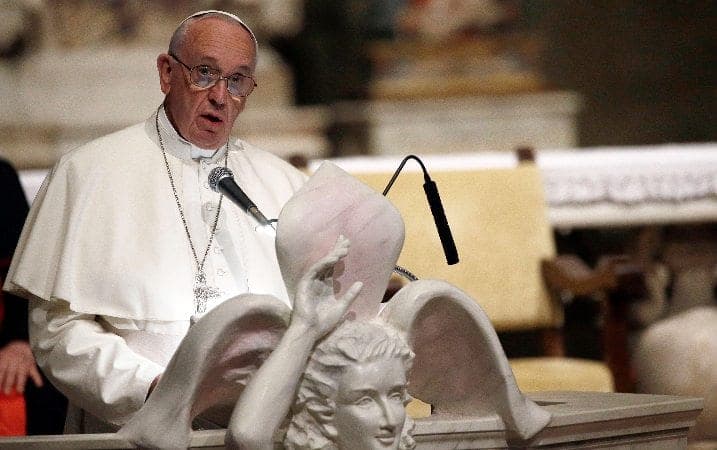Pope Francis offered a sweeping summary of his vision for the Catholic Church on Tuesday, telling a gathering of Italian Catholics in Florence that the Church must be open to change while rejecting a “controlling, hard, and prescriptive” style.
“… It is not useful to search for solutions in conservatism or fundamentalism,” the pope said. “We are not living an era of change, but a change of era.”
Christian doctrine, he added, “is not a closed system incapable of generating questions, doubts, queries, but it’s alive, and able to unsettle, animate.” Doctrine, Francis said, “has a face that isn’t rigid, a body that moves and develops, it has tender flesh: that of Jesus Christ.”
Francis’ 49-minute speech before the national conference of the Italian church — a meeting of 2,200 representatives of 220 dioceses — came as the Vatican copes with a new leaks scandal after two new books laid bare the pope’s uphill battle to reform the Italian-dominated Vatican bureaucracy.
While Francis did not offer specifics about changes he would like to see the Church embrace, his speech came across as a manifesto for his reforms, offering a programmatic synthesis of some of the main ideas of his papacy.
He called on Catholics to be “a free Church that is open to the challenges of the present, never on the defensive for fear of losing something.”
Speaking in Florence’s historic Cathedral of Santa Maria del Fiore, Francis centered his address on the official motto for the Florence meeting, “In Jesus Christ, a new humanism.” He warned against two heresies: “Pelagianism,” which denies the existence of original sin and holds that human beings can earn salvation by their own efforts without the grace of God, and “Gnosticism,” which holds that salvation is attained through the acquisition of knowledge rather than faith in a Supreme Being.
Pelagianism, the pope told the bishops and laypeople, “prompts the Church not to be humble, selfless, and blessed. It does so with the appearance of being a good.”
It “gives us confidence in structures, organizations, in perfect planning because it’s abstract,” he said, but it often leads Catholics to “take a controlling, hard, prescriptive style,” he said.
Pelagianism, Francis said, sees reform of the Church — “and the Church is semper reformanda (always reforming),” he said — as an alien concept. Reform, he added, is not about changing structures, but being “rooted in Christ, allowing the Spirit to lead us.”
Gnosticism, the pope said, “leads us to trust in a logical and clear reasoning which lacks the tenderness of the flesh of our brother or sister.”
According to Francis, the world’s fascination with Gnosticism lies in a “subjective” way of living the faith, guided by experiences or ideas that are meant to enlighten, but which trap one in “his or her thoughts and feelings.”
Instead of falling into these two heresies, Francis called on the Italian Church to be humble, to avoid being influenced by selfish motives, and to spread the joy of the Gospel.
In words directed to the Italian bishops, the pope called them to “be shepherds, and nothing else,” allowing the faithful to sustain them. “Don’t be preachers of complex doctrine, but announcers of Jesus Christ, who died and resurrected for us.”
He reminded the bishops that “the Lord shed his blood not for some, nor for a few, nor for many, but for all.”
Pope Francis also urged the Italian Church to make a preferential choice for the poor, fostering encounter and dialogue to seek the common good, something he addressed in his 2013 apostolic exhortation, “The Joy of the Gospel.”
“The poor know the feelings of Jesus Christ well because they know about Christ’s suffering from experience,” Francis said. “We are called to find Christ in them, to lend our voice to their causes, but also to be their friends, to listen to them, to speak for them, and to embrace the mysterious wisdom which God wishes to share with us through them.”
Dialogue, he said, doesn’t mean negotiation, but “seeking the common good of all.”
“We must not be afraid of dialogue,” Francis said. “In fact, it is discussion and criticism that help us to prevent theology from becoming ideology.”
Never one to miss an opportunity to talk to youth, Francis told young Italians to “get over apathy” and to “be builders of a better Italy.”
“Don’t let anyone despise your youth, but learn to be models of speaking and doing,” Francis said, adding that the youth shouldn’t “look at life from the balcony,” but commit themselves to social and political causes.
Francis started his one-day jaunt with a stop in the city of Prato, 15 miles from Florence, where he told a group of workers that there must be an end to the “cancer” of corruption and the “venom” of exploitation in the workplace.
“Society needs to be more fair and honest,” he said. “The sacredness of every human being requires for each respect, welcoming, and a fair job.”
Francis also thanked those present for their efforts to integrate everyone into the community, “in contrast to the culture of indifference and waste.” Departing from his prepared remarks, the pope recalled the seven Chinese citizens who were killed in Prato when the place where they worked and lived burned down.
The 2013 fire broke out at night in the clothing factory where the five men and two women were sleeping. Francis called the event a “tragedy of exploitation and inhuman life conditions.”
While in Prato, Francis venerated the “Girdle of Thomas,” a piece of cloth believed to be the sacred belt (Sacra Cintola) of the Virgin Mary. Legend holds that this relic, housed in Prato’s cathedral, was the belt dropped from Mary during her assumption.
In Florence, Francis was scheduled to have lunch with the poor in the refectory of St. Francis the Poor and celebrate Mass in a local stadium before heading back to Rome via helicopter.
Material from the Associated Press was used in this report.
















